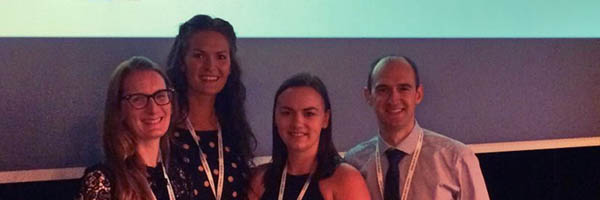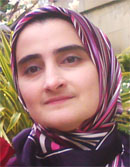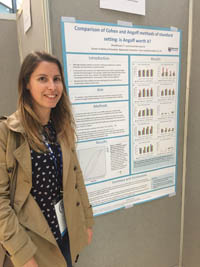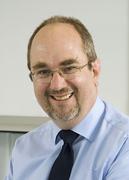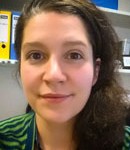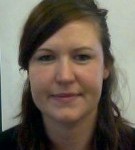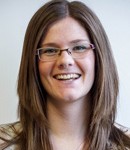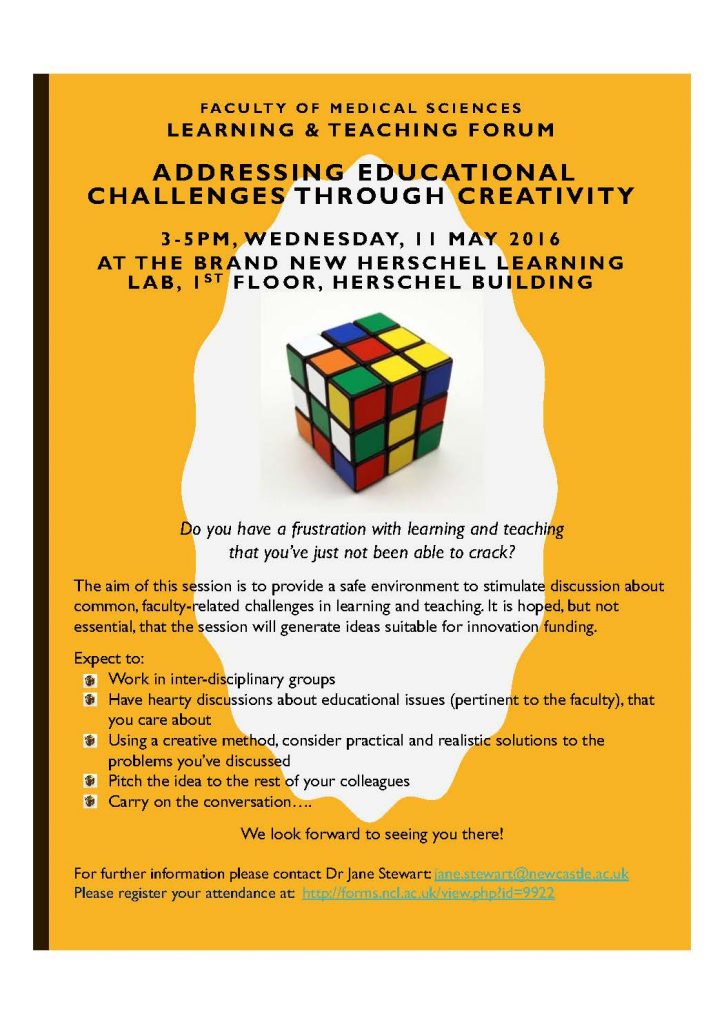 The Faculty of Medical Sciences Learning and Teaching forum was held at the beginning of May in the new Herschel Learning Lab, coinciding with the space’s official opening. Jane Stewart’s original design was brought to life by the power of three, with Luisa Wakeling and Alecia Dunn. The session stimulated discussion about common, faculty-related challenges in learning and teaching while showcasing the Learning Lab’s conspicuous potential with a speak-easy vibe. In response to the recent EDRP Development Grant and ULTSEC Innovation Funding calls, it was hoped that participants may seed new ideas that ultimately would bloom into potential bids.
The Faculty of Medical Sciences Learning and Teaching forum was held at the beginning of May in the new Herschel Learning Lab, coinciding with the space’s official opening. Jane Stewart’s original design was brought to life by the power of three, with Luisa Wakeling and Alecia Dunn. The session stimulated discussion about common, faculty-related challenges in learning and teaching while showcasing the Learning Lab’s conspicuous potential with a speak-easy vibe. In response to the recent EDRP Development Grant and ULTSEC Innovation Funding calls, it was hoped that participants may seed new ideas that ultimately would bloom into potential bids.
Facilitators Sarah Jayne Boulton, Sonia Bussey, Carlos Echevarria and Sarah Lockey worked alongside cross-faculty, interdisciplinary groups to explore a chosen educational conundrum. Participants were encouraged to creatively consider practical and realistic solutions to the problems selected for discussion. These discussions were frequently subverted by Luisa, Jane and Alecia through their introduction of troublemaking cards which flashed up on the groups’ screens and demanded immediate attention.
The disruptive cards were a new concept to most of the participants, including us facilitators, and were borne out of the Oblique Strategies designed by Brian Eno and Pete Schmidt. The cards we were exposed to during the session did not ask us to switch instruments or give way to our worst impulses, but instead questioned us to consider what would be different if money was no object or if we had infinite space. As soon as the card appeared, its idea was immediately considered within our discussions.
The 4 challenges independently chosen by the groups were:
- Student disengagement with lectures (and compulsory attendance isn’t the answer)
- Challenging strategic learning and embracing learning for learning sake
- Developing autonomous learners – moving away from the ‘how high do you want me to jump’ mentality
- Making diverse ability amongst students work within the classroom
It was interesting to see that the topics rooted very closely together, and it was refreshing to see that the changing cards resulted in unexpected changes not only in perspective, but in group dynamic too. During each groups concluding remarks it was evident that there was a lot of overlap in the room, reinforcing the prevalent notion that the same issues are present in every discipline and that collaboration and practice sharing may well bring about real change in all areas.
Sarah Lockey found that the removal of financial constraints suggested by one card enthused participants to really think outside of the piggy bank. Although this resulted in realistically unlikely strategies such as ‘give every student their own simulated clinic and don’t let them out until they can do everything’ and ‘mandatory 1:1 tutor to student ratio’ and the even more radical ‘link lecturers’ pay to their EvaSys scores’ there were equally many occasions where such blown-out thoughts collapsed and condensed themselves into previously unseen workable strategies.
The Learning Lab itself was a practical yet pliant venue, designed to envelope its occupants in a physically and digitally accessible flat floor interactive space with shared access to all screens and tools. The central console manned by Jane, Luisa and Alecia permitted screensharing by groups during the plenary discussion, facilitating the dissemination of generated ideas. There are a number of columns in the relatively low ceilinged room, meaning there were a few noise issues during individual discussions. We alleviated this with some creative whiteboard MacGyvery, however it seemed that certain positions (those closest to the edges of the room) were more affected than others. The Learning Lab also features what we have termed the ‘Jumpy Microphone’, a chuckable foam-protected microphone in a block that makes hearing your colleagues at the other end of the room much easier.
Although it was difficult at times to see how some of the more outré suggestions could be wound in, getting so many diversely invested people in a room together to share unabashed perspective and practise was an inspiring thing. Getting to know some new faces, including our new colleagues from Sport and Exercise Sciences was a real accent to the event. We all hope that the bridges built during the session will lead to greater future interdisciplinary collaboration on all levels.
In all the workshop proved to be an eye-opening and refreshing event for all, except perhaps for Prof Calvert who was most disappointed that she couldn’t write on the whiteboard resembling tabletops; maybe something to bear in mind for future learning space designs!
Sarah Jayne Boulton (BMS), Sonia Bussey (SME), Carlos Echevarria (SME) and Sarah Lockey (SME)
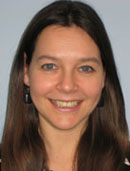 The AMEE conference, which is an International Medical Education conference held annually was attended by almost four thousand people and held in Helsinki, Finland this August. Three members of the Medical Education research team attended and presented their research at the conference.
The AMEE conference, which is an International Medical Education conference held annually was attended by almost four thousand people and held in Helsinki, Finland this August. Three members of the Medical Education research team attended and presented their research at the conference.

